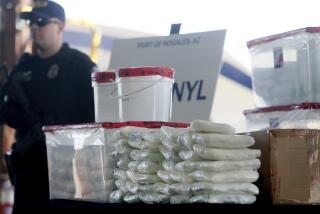U.S. to Seek Chemical Arms Talks : Reagan, at U.N., to Ask Halt in Spread in Third World
- Share via
WASHINGTON — President Reagan, in his final appearance as chief executive before the United Nations on Monday, plans to call for an international conference aimed at limiting proliferation of chemical weapons in the Third World, sources said Saturday.
The President’s proposal will come in direct response to new charges that Iraq recently may have used chemical weapons to kill thousands of Kurds living in towns and villages along the Turkish border. In addition, poison gas is known to have been used by both sides during the eight-year Iran-Iraq War.
Iraq Signed Protocol
A White House official, who declined to be identified by name, said Reagan will suggest that signatory nations to the 1925 Geneva Protocol that outlawed the use of poison gas be called together to discuss ways to reverse the rising danger of the use of chemical arms in Third World regional conflicts. Iraq is one of about 100 nations that signed the protocol.
Reagan will not single out Iraq in his U.N. speech but instead will raise the broader issue of the proliferation of chemical weapons in the Third World, the official said. He added that the recent cease-fire in the Iran-Iraq War has created a unique opportunity for the United States to initiate discussions seeking a new commitment on the part of the signatory nations.
According to a recent study by the Defense Intelligence Agency, about 20 nations have chemical weapons. Besides the United States and the Soviet Union, they are believed to include Israel, Egypt, Syria, North Korea and Taiwan. In addition, the State Department has said that Libya is on the verge of full-scale production.
Trade Embargo Near
Reagan’s appeal for an international conference will come at a time when Congress is close to passing legislation that would block U.S. trade with Iraq until the President can certify that Baghdad has renounced the use of chemical warfare.
Although Administration officials have denounced Iraq’s use of poison gas, the White House is on record as being opposed to economic sanctions. U.S. officials have said they would rather rely on diplomacy to achieve a change in the Iraqi policy.
To bolster the case for sanctions, the Senate Foreign Relations Committee issued a report last week based on eyewitness accounts that accused Iraq of genocide in its use of poison gas against the Kurdish minority. Senate investigators said Iraq had used mustard gas, which causes vomiting and blocks respiration after several hours, as well as a nerve gas that kills quickly. The report concluded: “Poison gas is Iraq’s final solution to its Kurdish insurrection.”
In Baghdad, Iraqi Foreign Minister Tarik Aziz said last week that his country “respects and abides by all provisions of international law and international agreements accepted by the international community,” presumably including the 1925 Geneva Protocol.
Until now, negotiations under the 1925 Geneva Protocol have focused on the elusive goal of an agreement governing production of chemical weapons by the United States and the Soviet Union. But Reagan’s national security adviser, Lt. Gen. Colin L. Powell, said last week that the Administration now thinks a more comprehensive, worldwide ban is necessary.
In his regular Saturday radio address, Reagan said he would use his U.N. speech to discuss what steps the nations of the world should take “in the next eight and the next 80 years” to make the world safer. However, he did not mention chemical weapons.
“My message this year to the delegates of the United Nations will be a message of hope,” he said. “This year, as we survey the scene one last time, we can see that our strength has indeed proven to be the engine of peace and hope in the world.”
It was not known whether the President, a longtime critic of the United Nations, would refer to his recent surprise decision to pay $44 million in U.S. assessments owed to the world organization. As the richest U.N. member, the United States is expected to pay one-fourth of the organization’s general expenses and a similar proportion of the budgets of specialized U.N. agencies and peacekeeping efforts.
On Friday, the Administration asked Congress to divert as much as $150 million in defense and foreign aid money to help launch U.N. peacekeeping and truce monitoring operations in trouble spots that include Afghanistan, Iran and Iraq.
More to Read
Sign up for Essential California
The most important California stories and recommendations in your inbox every morning.
You may occasionally receive promotional content from the Los Angeles Times.










